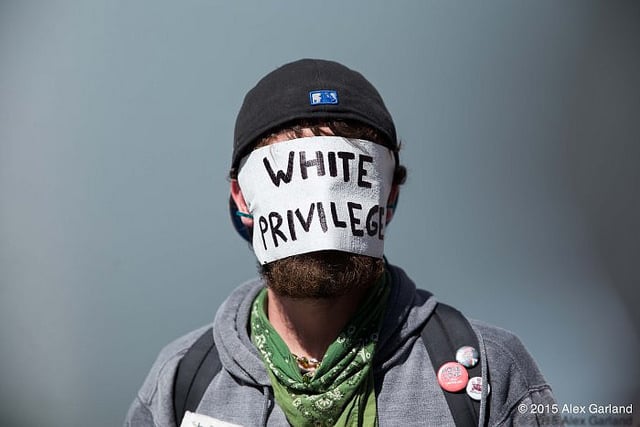
The thing with race is that as long as we pretend we aren’t different, we’re going to continue to be treated as if we are.
There is nothing beautiful or accepting in saying that I don’t see skin color when we (as Caucasians) see someone from a non-Caucasian background because that is essentially denying an important part of who they are. The truth is that only in White America are we able to separate ourselves from our skin color—for everyone else it is an issue to be dealt with continuously.
But this is something we aren’t supposed to talk about, right?
And as a white woman, I’m especially not supposed to talk about this, right?
Well, that is the stigma and disease that is associated with upholding white fragility and the entire race system, as well. First of all, Caucasian people are conditioned to not talk about race so that somehow they won’t accidentally seem racist, yet all that really is accomplished is that we go around pretending there isn’t an issue when there really is.
I know that these words may not make me popular, but sometimes the truth becomes more important than just making people happy, and the reality is that there is a systemic problem of white fragility in this country. The fact is that it has been in place since the days of slavery when white women were painted as weak and frail beings that runaway African slaves would take advantage of.
Yes, our issues and vision around race are still connected to the days of slavery, but I suppose that is just one more thing I’m supposed to overlook or pretend isn’t an issue, right?
As a woman born into rural America with light skin, I have been able to enjoy white privilege. This is not something that I was conscious of growing up nor is it something that I’m proud of as I write this, but whether I like it or not doesn’t, in fact, make it untrue.
I am able to live my life under the safety net of being white, and I even have used it to my advantage; I have been asked multiple times if I was Irish and replied, of course, because of my maiden name and features that could pass for Irish—even thought the truth is that I’m probably less than five percent.
I’ve been told that acknowledging that white privilege exists is a “betrayal to my race,” numerous times because of different racial pieces that I have written. The fact is that there is a White America and a Black America—two very different countries, and rarely can someone cross that border to see what life is like on the other side.
Recently, Jonathan Ferrell, a man from North Carolina, was shot dead by police after he went knocking on a door at night looking for help after being in a car accident with his girlfriend. When the owner of the house called the police, she reported that a black man was trying to break into her home—the reality is, had this been a white woman knocking on her door, or even a white man, the ending to this story would be vastly different.
The United States was designed to provide privilege to white people, but also to protect them from having to think about and consider various racial issues that still plague our nation today. The fact is, just by being white in the United States, we are free from actually having to think about race on a daily basis.
What a luxury it is to be able to pretend skin color doesn’t exist when no one lives their lives reminding you of it every single day.
This piece isn’t about igniting race wars, but it is about breaking that safety glass of white fragility and privilege that many don’t want to believe they still enjoy. The fact is that we cannot make things better until we actually acknowledge that racism is still present, or even the simple fact that, as someone with light skin, you will be treated differently than someone with darker skin.
In Farrell’s case, we even see how the idea of white fear played a significant part in his death. The idea that blackness somehow equals danger is a stereotype that has deep roots which were planted by white slaveholders in an effort to gain and keep control of slaves—specifically black men.
Yet, all this time later, and we are still seeing that play out as an issue on our streets. Whether it’s done consciously or subconsciously, people of color adopt various tactics to try to subdue the irrational white fear of those around them through clothing, straightening their hair, or even shaving completely—all in an effort to blend in.
Funny, I’ve never heard of a white person trying to not look as white when going for a job interview.
Because our vision is deeply rooted into the history of our country, only by going back and digging through it can we actually begin to redirect where we need to go from here. Racial profiling and stereotypes still are an issue, and the fact remains that as long as white privilege and fragility exists, it won’t be getting any better.
We have to stop being so afraid of speaking up, of saying the wrong thing, or of speaking heatedly about an issue, because the longer we try to protect ourselves from saying the wrong thing, the longer it’s going to take for all of us to start doing the right thing.
But it begins here, with me and with you, with not being afraid to stand up and speak the truth. It comes in owing a part of who we are, not because we’re proud of our whiteness but because we know that it needs to change.
And because the reality is that by pretending all of this doesn’t exist only reaffirms the stereotypes that white people have built for themselves.
So, let us break that glass of fragility. I know we have it in our ability to make a difference—but it sure as hell ain’t gonna come from our indifference.
~
~
~
Author: Kate Rose
Image: Flickr/Backbone Campaign
Editor: Travis May
Copy Editor: Callie Rushton
Social Editor: Waylon Lewis








Read 0 comments and reply